最新初中英语动词短语归纳97022讲课教案
- 格式:doc
- 大小:37.00 KB
- 文档页数:3
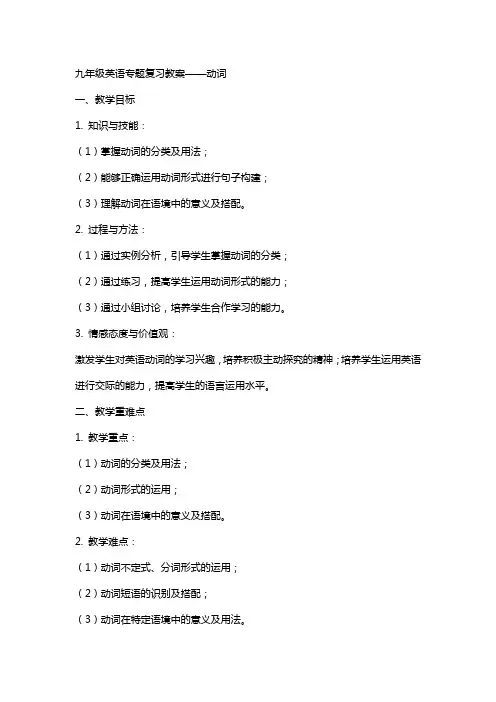
九年级英语专题复习教案——动词一、教学目标1. 知识与技能:(1)掌握动词的分类及用法;(2)能够正确运用动词形式进行句子构建;(3)理解动词在语境中的意义及搭配。
2. 过程与方法:(1)通过实例分析,引导学生掌握动词的分类;(2)通过练习,提高学生运用动词形式的能力;(3)通过小组讨论,培养学生合作学习的能力。
3. 情感态度与价值观:激发学生对英语动词的学习兴趣,培养积极主动探究的精神;培养学生运用英语进行交际的能力,提高学生的语言运用水平。
二、教学重难点1. 教学重点:(1)动词的分类及用法;(2)动词形式的运用;(3)动词在语境中的意义及搭配。
2. 教学难点:(1)动词不定式、分词形式的运用;(2)动词短语的识别及搭配;(3)动词在特定语境中的意义及用法。
三、教学方法1. 情境教学法:通过设置各种真实的语境,让学生在实际情境中学习、运用动词;2. 任务型教学法:设计各种任务,让学生在完成任务的过程中,提高运用动词的能力;3. 小组合作学习:引导学生分组讨论,共同探究动词的用法,培养学生的合作意识。
四、教学过程1. 导入:通过提问方式引导学生回顾已学过的动词知识,为新课学习做好铺垫;2. 讲解:讲解动词的分类、用法及动词形式的变化;3. 练习:设计各种练习题,让学生在实践中掌握动词的用法;4. 拓展:介绍动词的搭配及语境意义,引导学生学会运用;5. 总结:对本节课的内容进行总结,强调重点知识。
五、课后作业1. 整理本节课所学的动词知识点,形成笔记;2. 完成课后练习题,巩固所学知识;3. 搜集动词搭配的实例,进行学习交流。
六、教学评价1. 课堂表现:观察学生在课堂上的参与程度、提问回答等情况,了解学生的学习状态;2. 练习完成情况:检查学生课后练习的完成质量,评估学生对动词知识的掌握程度;3. 小组讨论:评价学生在小组合作学习中的表现,包括交流、合作、探究等方面;4. 课后反馈:收集学生的学习反馈,了解学生在学习过程中遇到的问题,为下一步教学提供参考。
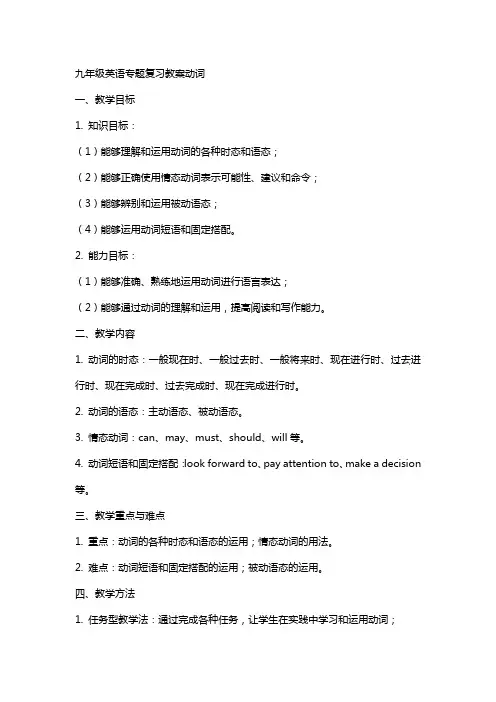
九年级英语专题复习教案动词一、教学目标1. 知识目标:(1)能够理解和运用动词的各种时态和语态;(2)能够正确使用情态动词表示可能性、建议和命令;(3)能够辨别和运用被动语态;(4)能够运用动词短语和固定搭配。
2. 能力目标:(1)能够准确、熟练地运用动词进行语言表达;(2)能够通过动词的理解和运用,提高阅读和写作能力。
二、教学内容1. 动词的时态:一般现在时、一般过去时、一般将来时、现在进行时、过去进行时、现在完成时、过去完成时、现在完成进行时。
2. 动词的语态:主动语态、被动语态。
3. 情态动词:can、may、must、should、will等。
4. 动词短语和固定搭配:look forward to、pay attention to、make a decision 等。
三、教学重点与难点1. 重点:动词的各种时态和语态的运用;情态动词的用法。
2. 难点:动词短语和固定搭配的运用;被动语态的运用。
四、教学方法1. 任务型教学法:通过完成各种任务,让学生在实践中学习和运用动词;2. 情境教学法:创设各种情境,让学生在真实的环境中理解和运用动词;3. 合作学习法:引导学生互相讨论和交流,共同提高动词运用的能力。
五、教学过程1. 导入:通过一个简单的动词游戏,激发学生的学习兴趣,复习动词的基本概念。
2. 新课导入:讲解动词的各种时态和语态,并通过例句和练习进行巩固。
3. 课堂练习:设计一些练习题,让学生运用动词的时态和语态进行填空和改写句子。
4. 小组讨论:让学生分组讨论,交流动词短语和固定搭配的用法。
6. 课后作业:布置一些相关的练习题,让学生巩固所学知识。
六、教学评价1. 课堂表现评价:观察学生在课堂上的参与程度、任务完成情况和语言运用能力。
2. 练习题评价:对学生的练习题进行批改,了解学生对动词时态和语态的掌握程度。
3. 小组讨论评价:评价学生在小组讨论中的表现,包括合作意识、交流能力和创意性。
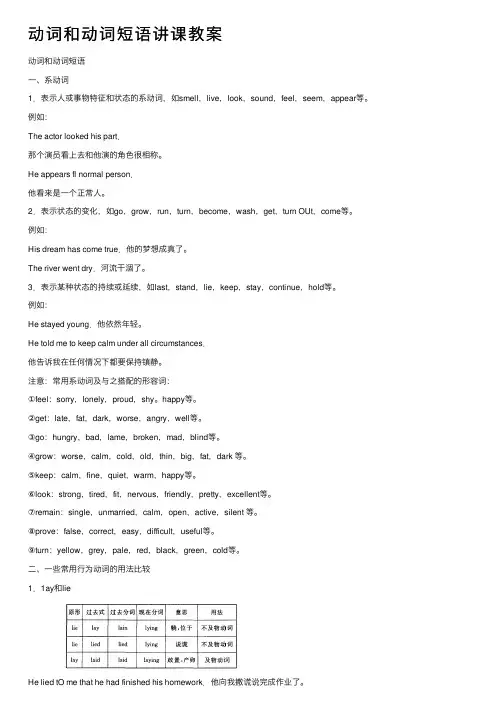
动词和动词短语讲课教案动词和动词短语⼀、系动词1.表⽰⼈或事物特征和状态的系动词,如smell,live,look,sound,feel,seem,appear等。
例如:The actor looked his part.那个演员看上去和他演的⾓⾊很相称。
He appears fl normal person.他看来是⼀个正常⼈。
2.表⽰状态的变化,如go,grow,run,turn,become,wash,get,turn OUt,come等。
例如:His dream has come true.他的梦想成真了。
The river went dry.河流⼲涸了。
3.表⽰某种状态的持续或延续,如last,stand,lie,keep,stay,continue,hold等。
例如:He stayed young.他依然年轻。
He told me to keep calm under all circumstances.他告诉我在任何情况下都要保持镇静。
注意:常⽤系动词及与之搭配的形容词:①feel:sorry,lonely,proud,shy。
happy等。
②get:late,fat,dark,worse,angry,well等。
③go:hungry,bad,lame,broken,mad,blind等。
④grow:worse,calm,cold,old,thin,big,fat,dark 等。
⑤keep:calm,fine,quiet,warm,happy等。
⑥look:strong,tired,fit,nervous,friendly,pretty,excellent等。
⑦remain:single,unmarried,calm,open,active,silent 等。
⑧prove:false,correct,easy,difficult,useful等。
⑨turn:yellow,grey,pale,red,black,green,cold等。
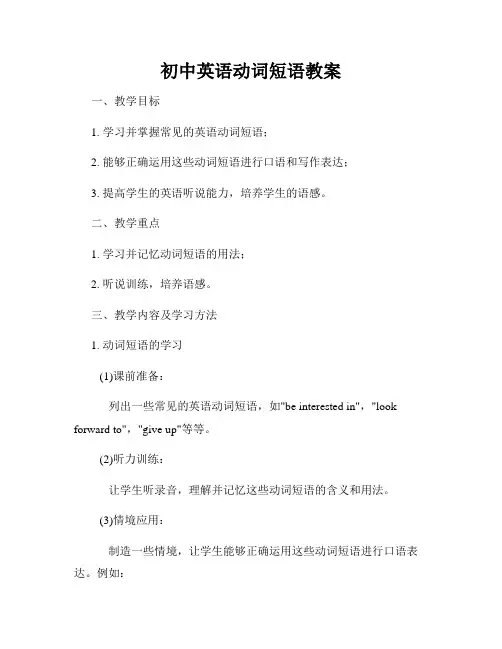
初中英语动词短语教案一、教学目标1. 学习并掌握常见的英语动词短语;2. 能够正确运用这些动词短语进行口语和写作表达;3. 提高学生的英语听说能力,培养学生的语感。
二、教学重点1. 学习并记忆动词短语的用法;2. 听说训练,培养语感。
三、教学内容及学习方法1. 动词短语的学习(1)课前准备:列出一些常见的英语动词短语,如"be interested in","look forward to","give up"等等。
(2)听力训练:让学生听录音,理解并记忆这些动词短语的含义和用法。
(3)情境应用:制造一些情境,让学生能够正确运用这些动词短语进行口语表达。
例如:Teacher: What are you interested in?Student: I'm interested in playing basketball.(4)书面训练:给学生一些书面任务,让他们能够在写作中正确使用这些动词短语。
四、教学过程1. 导入:利用图片或 realia 引入一些动词短语,激发学生对这些短语的兴趣。
2. 学习动词短语:让学生跟随录音逐个学习这些动词短语,并重复朗读和记忆。
3. 口语训练:运用情境设计一些问答练习,培养学生运用动词短语进行口语表达的能力。
4. 阅读练习:制作一些阅读材料,让学生读并找出其中的动词短语,加深对其理解并提高阅读能力。
5. 书面训练:给学生一些书面任务,要求他们在书写中正确使用这些动词短语,提高写作能力。
五、巩固与拓展1. 情景演练:设计一些情景,让学生根据情景要求运用所学动词短语进行演练,加深理解并提高语感。
2. 课外拓展:鼓励学生在课余时间多阅读英语资料,积累更多的动词短语,并灵活运用于实际生活和学习中。
六、教学反思本节课通过听说训练、口语训练和书面训练等多种形式,全面培养了学生对英语动词短语的学习和运用能力。
通过情景训练和拓展任务,帮助学生更好地理解和运用这些动词短语。

2.初中英语要点词组初中英语教材中共出现近500个词组,此中有一部分为常用词组,要求能娴熟运用。
在学习中,要注意词组的累积,特别要注意介词词组和短语动词的累积。
3. 对固定词组的意义,切不行望文生义。
比如,动词look 原意为“看”,但lookafte r意为“照顾”,lookup(awordinadictionary)意为“(在词典中)查找(单词)”。
4.要十分注意固定词组中冠词的使用。
有时冠词可惹起词义的变化,比如:gotheschool意为“上学”,而gototheschool意为“到学校里去”;takeplace意为“发生”,而taketheplace意为“取代”。
有些词组中须用冠词,而另一些则不用。
比如:intheevening,atnight。
一、动词词组(包含短语动词)、介词词组和其余词组(一)由be组成的词组1)beback/in/out回来/在家/出门2)beathome/work在家/上班3)begoodat善于,善于于4)becarefulof 当心,注意,仔5)becoveredwith 被⋯⋯复盖6)bereadyfor ⋯⋯作好准7)besurprised(at) ⋯⋯感觉惊8)beinterestedin ⋯⋯感觉9)beborn 出生10)beon内行,在演出,(灯)亮着11)beabletodosth. 能做⋯⋯12)beafraidof(todosth.that ⋯) 惧怕⋯⋯(不敢做⋯⋯,唯恐⋯⋯)13)beangrywithsb. 生(某人)的气14)bepleased(with) ⋯⋯感觉高(意)15)befamousfor 以⋯⋯而有名16)bestrictin(with) (工作、人)格要求17)befrom 来自⋯⋯,什么地方人18)behungry/thirsty/tired 了/渴了/累了19)beworried 担20)be(well)worthdoing( 特别)得做⋯⋯21)becoveredwith 被⋯⋯所覆盖⋯⋯22)bein(great)needof (很)需要23)beintrouble 于窘境中24)begladtodosth. 很高做⋯⋯25)belatefor ⋯⋯到26)bemadeof(from) 由⋯⋯制成27)besatisfiedwith ⋯⋯感觉意28)befree 空的,有空29)be(ill)inbed 卧病在床30)bebusydoing(with) 忙于做⋯⋯(忙于⋯⋯)(二) 由come,do,get,give,go,have,help,keep,make,looke,put,set,send,take,turn,play 等组成的1)comeback 回来2)comedown 下来3)comein 入,来comeon快,走吧,跟我来5)come out出来6)come outof从⋯⋯出来7)come up上来8)comefrom来自⋯⋯9)doone'slessons/hom ework做功/回家作10)domorespeaking/reading多做口/朗11)doone'sb est全力12)dosomeshopping(cookingreading,cleaning)西(做菜,点,大除)13)doagooddeed(gooddeeds)做一件好事(做好事)14)domorningexercises做晨操15)doeyeexercises做眼保健操dowellin在⋯⋯某方面干得好17)getup起身18)geteveryth ingready把全部都准好19)getreadyfor(=bereadyfor)⋯⋯作好准20)geton(well)with与⋯⋯相(和睦)21)getba ck返回22)getridof除去,去除23) getin入,采集24)geton/off上/下25) getto抵达26)getthere抵达那边27)givesb.acall⋯⋯打28)giveatalk作告29)givealecture(apianoconcert)作座(行琴音会)30)giveb ack,送回31) give⋯someadviceon⋯⋯一些忠告32)givelessonsto⋯⋯上33) givein折服34)giveu p放弃35)givesb.achance⋯⋯一次时机36)giveamessageto⋯⋯⋯一个口信37)goahe ad先走,向前走,去吧,干吧38)gotothecin ema看影39)gogob ed睡(makethebed整理床)40)gotoschool (college)上学(上大学)41)goto(the)hospital去医院看病42)goover一遍,复/gooverto朝⋯⋯走去43)gofishing/skating/swimming/shopping去/溜冰/游泳/西44)gohome(the re)回家去(去那边)45)goround便去,道走46) goup上去47)gooutforaw alk出门漫步48)goon(doing)(做⋯⋯)49)goonwithon e'swork某人的工作50)goupstairs/downst上/下楼airs51)(thelights )goout(灯)熄了52)havealesson(lessons)/ameeting上/开会53)haveafootballmatch(basketballmatch)行一足球(球)54)havedictation听55)haveatry一56)haveagood/wonderfulti me玩得很高57)havealecture(apianoconcert)听座(听琴音会)58)haveareport (talk)on 听一个对于⋯⋯的告59)haveaglassofwater(acupoftea)喝一杯水,(一杯茶)60)havebreakfast/lunch/supper吃早/午/晚61)haveameal(threemeals)吃一(三餐)62)haveadinner吃正餐63)havebreadandmilkforbreakfast早吃面包和牛奶64)have(havegot)aheadache痛65)haveafever66)haveacough(acold)咳嗽(感冒)67)havealook( at)看一看⋯⋯68)havearest(abreak)歇息一会儿(工或歇息)69)haveatalk70)haveaswim/walk游泳/漫步71)haves ports行体育72)haveasportsmeet(meeting)开运会73)havesomethingdone人(人)做⋯⋯74)haveatest/anexam/考75)havea nidea有了个想法76)hadbetterdosth.(not dosth.)最好做⋯⋯(最好不要做⋯⋯)77)haveawordwith与⋯⋯几句78)helpsb.withsth.helpsb.dosth.在⋯⋯方面帮助⋯⋯帮助⋯⋯做79)helponeselftosomechicken/fish/meat随意吃点//肉80)helpeachot her相互帮助81)keepupwith跟上⋯⋯,不落伍于⋯⋯82)keepsilent/quiet保持缄默/寂静83)keepsb.doingsth.使⋯⋯向来做⋯⋯84)keepone'sdiary日85)makeanoise(alotofnoise,muchnoise,no ises)吵(十分嘈,响声)86)makealiving生87)makesb.dosth.迫使某人做⋯⋯88)makefaces( aface)做鬼89)makefriends(with)与⋯⋯交朋友90)makeamistake(mistakes)犯91)makeroom/spacefor⋯⋯出地方92)makeasentence(sente nces)with用⋯⋯造句93)makeafire生火94)bemadefrom /of由⋯⋯制成95)bemad ein 在⋯⋯地方制造96)lookoutof( outside)往外看(看外面)97)lookupaword(inthedi ctionary)词典98)lookup往上看,仰望lookafter照料,照看,照100)lookfor 找101)looklike 看上去像102)lookfine/well/tired/worried 看起来气色好/健康/疲/ 103)lookout 当心,当心104)lookon ⋯as ⋯把⋯⋯看作⋯⋯对待105)lookaround 朝周围看106)lookat 看着⋯⋯puton穿上(衣服),戴上(帽子),演出() putup建筑,搭起,挂起,起,帖109)putinto使入,入110)putone's heartinto全神注于11 1)put⋯down⋯把⋯⋯放下11 2)put⋯into⋯把⋯⋯成113)setup起,建起114)setoff出,身115)setout出116)setanexamplefor⋯⋯立榜117)sendfor派人去(叫)118)sendout放出,出119)endup把⋯⋯往上送,射120)takeone' sadvice遵从某人告121)takeout取出,取出122)takedown拿下123)takeplace生124)takeone'坐⋯⋯的座位,取代某splace人125)takethep laceof取代⋯⋯126)takeawal k/rest漫步/歇息127)takeiteasy128)takesb.随身着129)takesb.toapark/Londonforone'sholidays某人去公园/敦度假130)takec areof关怀,照,保存131)takealook(alastlook)at看一看(最后看一眼)132)takeanexam参加考133)takeaway拿走134)takeback回收,回135)takeholdof抓住⋯⋯136)takeoff脱下(衣,帽,鞋等)拿掉137)take(anactive)partin (极)参加(活)138)takephotos 摄影139)takesomemedicine 服140)takeabus/train/boat 乘公共汽,火/船141)turnon开,旋开(灯,收音机等)turnoff关上(灯,收音机等)143)turnin 交出,上交144)turn ⋯into ⋯成⋯⋯145)turnto 翻到,向146)turndown (把音量)低147)turn ⋯over 把⋯⋯翻来148)playbasketball/football/volleyb all打球/踢足球/打排球149)playga mes做游150)playthepiano(theviolin)琴(拉小提琴)151)playwi thsnow玩雪152)playajoke(on)⋯⋯开玩笑(三)由其余组成的153)thinko ver仔考154)arriveat/inaplace抵达某155)e atup吃完,吃光156)dowellin在⋯⋯干得好157)enjoydoingsth./likedoingsth.喜做某事/喜干某事158)findout,出(实情等)159)finish off吃完,喝完160)stopdoingsth.停止做某事161)stoptodosth.停下往来做某事162)holdam eting行会163)holdup起164)hurryu p赶忙,快点165)enterf or名参加166)langhtat嘲讽167)beusedto于168)u sedto去经常169)wake⋯up醒170)workout算出二、短、介短和其余1)askfor向⋯⋯要⋯⋯,求2)askforleave假3)sen dfor派人去(叫)4)pay for付⋯⋯的款5)waitfor等待6)thankfor⋯⋯感7)apologizetosb.fors th.某事向某人致歉8)lookfor找9)leave⋯for走开⋯⋯去⋯⋯10)falloff跌落11)catchco ld着凉,12)catchup with追上13)agreewithsb.成,赞同某人的意14)fi lled⋯with把⋯⋯装15)tellsb.aboutsth.告某人某事16)talkabout⋯⋯17)thinkab out考⋯⋯18)worryab out担⋯⋯19)lookafter照顾20)runafter追赶,跟在后边跑21)readafter跟⋯⋯22)smileat⋯⋯浅笑23)knockat敲(、窗)24)shoutat⋯⋯大叫(嚷)25)throwaway抛弃26)workha rdat努力做⋯⋯27)waitin line排等待28)ch ange⋯into⋯成⋯⋯29)hurryinto⋯仓促入⋯⋯30)runinto⋯跑⋯⋯31)hearof听⋯⋯32)thinkof,考⋯⋯33)catchh oldof抓住⋯⋯34)insteadof取代⋯⋯35)handin交上来36)stayin bed卧病在床37)hearfr收到⋯⋯om来信38)at once马上39)at last最后40)at first起初,第一41)attheageof⋯在⋯⋯42)attheendof⋯在⋯⋯之末43)atthebeginningof⋯在⋯⋯之初44)atthefootof在⋯⋯脚下45)atthesametime同46)atnight/noon在夜里/正午47)withon e'shelp在某人的帮助下,因为某人的帮助48)withthehelpof⋯在⋯⋯的帮助下49)withas mile面笑脸50)withone'sowneyes眼看51)aftera while了一会儿52)fromno won从在起53)fromth enon从那起54)farexample比如55)farawayfrom离56)frommorningtillnight从早到晚57)byandby不久58)byairm ail寄航空件59)byordinary mail寄平信60)bytheway便61)bythew indow在窗62)bytheendof⋯到⋯⋯底止63)little bylittle逐地64)inall共65)infact事上66)inone'stwenties在某人二十几67)ina hurry仓促68)inthemiddleof在⋯⋯中69)innotime(inaminute)马上,很快70)intime(ontime)及71)inpublic民众,公然地72)inorderto了⋯⋯73)infrontof在⋯⋯前方74)int hesun在阳光下75)intheend最后,于76)ins urprise诧异地77)inturn挨次78)ofc ourse自然79)abit(of)有一点儿80)alotof多81)onone's某人在去⋯⋯的路上wayto82)onf oot步行,走路83)atalkonspace一个对于太空的告84)ontheotherhand另一方面85)at/ontheweekend在周末86)ontheleft(right)在左(右)87)ontheothersideof在⋯⋯另一88)ontheradio通收音机(无广播)89)toone'sjoy使⋯⋯高的是90)toone'ssurprise使⋯⋯惊的是三、量和其余(一)量1)abit一点儿2)afew(of)一些(可数),几个⋯⋯3)alittle一些(不行数)4)alotof(lotsof)多5)apieceof一(一片,)6)acupof一茶7)agla ssof一玻璃杯8)apileof(pilesand一堆(一堆堆pilesof)的)⋯⋯9)aboxof一盒10)acopyof一份,一本11)abo wlof一碗12)abasketof一13)aplateof一14)abo ttleof一瓶15)aba sinof一盆16)asetof一套17)akindo f一种18)atypeo f一种种类的19)agreat dealof特别多,大批的(不行数名词)20)alarge(great)numb erof 特别多,大批的(可数名词)21)agreatmany大批,很多(可数名词)22)adifferenttypeof一种不一样型号的23)agroup of一队,一组,一群(二)其余词组1)allkind sof各种各种的2)allovertheworld/theco untry 全球/全国3)allover遍布每一部分,全身4)allone'slife一世5)oneafteran other按序6)theChildre n'sPalace少年宫7)dayafte rday日复一日8)upanddo wn上上下下9)thedayaftertom后orrow天10)thedaybeforeyeste rday前天11)thelast/pasttwoyears (orso)近来两年(左右)12)thewholecountry/thewholeworld全国/全球13)amomentago方才14)justno w/then方才/那时15)halfanhour'swalk步行半小时的行程16)lateon事后,以后1、makefaces做鬼2、makethebed整理床3、makedumplings包子4、bemadeof/from由⋯⋯制成5、bemadeupof由⋯⋯成6、bemadein于7、bemadeby由某人制造8、makeacontributiontodoing⋯⋯献9、makeamistake犯1 0、makethesamemistake犯同的1makeone’sway to⋯往⋯⋯1、走1 2、makefunof讥笑,嘲讽1 3、makeanoise出噪音1 4、makesomebodydosomething使某人做某事1 5、somebodybemadetodosomething.某人被迫做某事1 6、makeoneselfunderstood使自己被理解1 7、makesure必,保1 8、makefriendswith⋯和某人交朋友1 9、makeadecision做决定2 0、makeupone’smindtodosomething下定信心做某事2 1、makeroomfor⋯⋯出地方2 2、makeatelephonecall打⋯⋯23、makemoney2 4、makeashoppinglist写一个物25、makeup造2 6、make(full)useof(充足)利用⋯⋯2 7、makecakes做蛋糕2 8、makebreakfast做早2 9、makeyourselfathome不要客气3 0、makeafire生火3 1、maketea 沏茶3 2、makeone’sliving生33、makeit定3 4、maketrouble惹起麻。
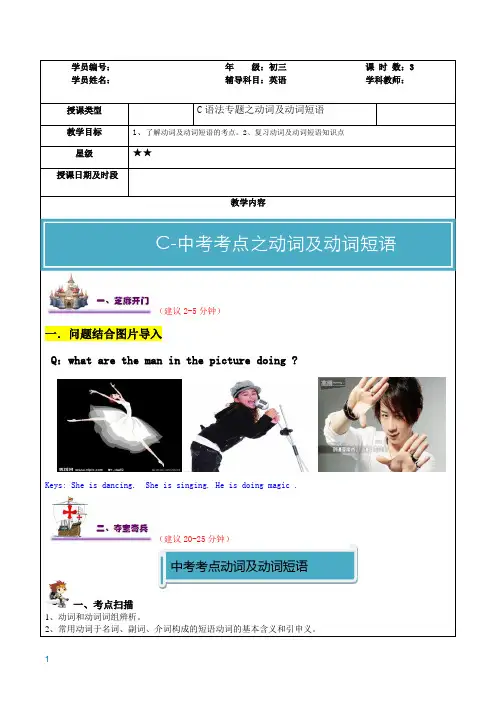
学员编号:年级:初三课时数:3 学员姓名:辅导科目:英语学科教师:授课类型C语法专题之动词及动词短语教学目标1、了解动词及动词短语的考点。
2、复习动词及动词短语知识点星级★★授课日期及时段教学内容C-中考考点之动词及动词短语(建议2-5分钟)一.问题结合图片导入Q:what are the man in the picture doing ?Keys: She is dancing. She is singing. He is doing magic .(建议20-25分钟)中考考点动词及动词短语一、考点扫描1、动词和动词词组辨析。
2、常用动词于名词、副词、介词构成的短语动词的基本含义和引申义。
二、考点诠释一、系动词的考查系动词亦称联系动词(Link Verb),作为系动词,它本身有词义,但不能单独用作谓语,后边必须跟表语(亦称补语),构成系表结构说明主语的状况、性质、特征等情况。
英语中常见的表示状态变化的系动词主要有:1)状态系动词用来表示主语状态,只有be一词,例如:He is a teacher. 他是一名教师。
(is与补足语一起说明主语的身份。
)2)持续系动词用来表示主语继续或保持一种状况或态度,主要有keep, rest, remain, stay, lie, stand, 例如:He always kept silent at meeting. 他开会时总保持沉默。
This matter rests a mystery. 此事仍是一个谜。
3)表像系动词用来表示"看起来像"这一概念,主要有seem, appear, look, 例如:He looks tired. 他看起来很累。
He seems (to be) very sad. 他看起来很伤心。
4)感官系动词感官系动词主要有feel, smell, sound, taste, 例如:This kind of cloth feels very soft.这种布手感很软。
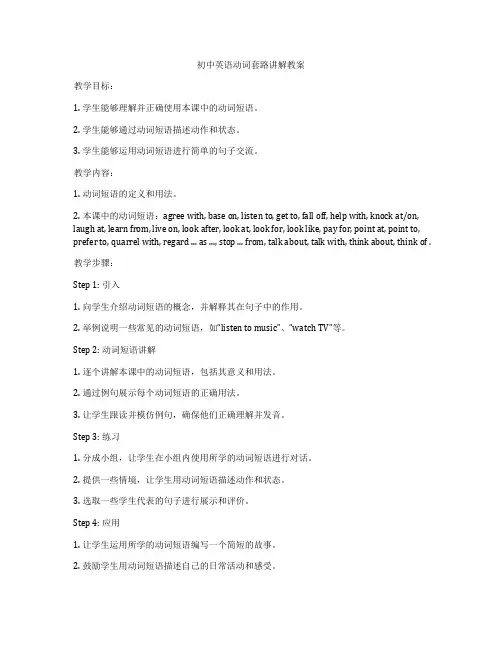
初中英语动词套路讲解教案教学目标:1. 学生能够理解并正确使用本课中的动词短语。
2. 学生能够通过动词短语描述动作和状态。
3. 学生能够运用动词短语进行简单的句子交流。
教学内容:1. 动词短语的定义和用法。
2. 本课中的动词短语:agree with, base on, listen to, get to, fall off, help with, knock at/on, laugh at, learn from, live on, look after, look at, look for, look like, pay for, point at, point to, prefer to, quarrel with, regard ... as ..., stop ... from, talk about, talk with, think about, think of。
教学步骤:Step 1: 引入1. 向学生介绍动词短语的概念,并解释其在句子中的作用。
2. 举例说明一些常见的动词短语,如“listen to music”、“watch TV”等。
Step 2: 动词短语讲解1. 逐个讲解本课中的动词短语,包括其意义和用法。
2. 通过例句展示每个动词短语的正确用法。
3. 让学生跟读并模仿例句,确保他们正确理解并发音。
Step 3: 练习1. 分成小组,让学生在小组内使用所学的动词短语进行对话。
2. 提供一些情境,让学生用动词短语描述动作和状态。
3. 选取一些学生代表的句子进行展示和评价。
Step 4: 应用1. 让学生运用所学的动词短语编写一个简短的故事。
2. 鼓励学生用动词短语描述自己的日常活动和感受。
Step 5: 总结1. 对本课的动词短语进行复习和总结。
2. 强调动词短语在日常英语交流中的重要性。
教学评估:1. 在练习环节,观察学生的对话,评估他们对于动词短语的理解和运用情况。
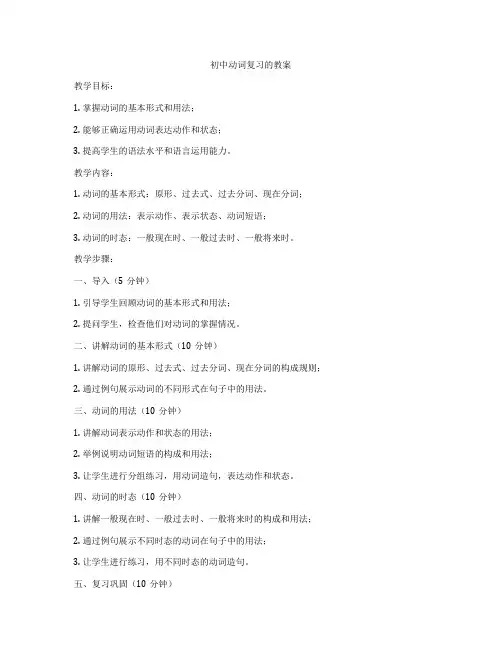
初中动词复习的教案教学目标:1. 掌握动词的基本形式和用法;2. 能够正确运用动词表达动作和状态;3. 提高学生的语法水平和语言运用能力。
教学内容:1. 动词的基本形式:原形、过去式、过去分词、现在分词;2. 动词的用法:表示动作、表示状态、动词短语;3. 动词的时态:一般现在时、一般过去时、一般将来时。
教学步骤:一、导入(5分钟)1. 引导学生回顾动词的基本形式和用法;2. 提问学生,检查他们对动词的掌握情况。
二、讲解动词的基本形式(10分钟)1. 讲解动词的原形、过去式、过去分词、现在分词的构成规则;2. 通过例句展示动词的不同形式在句子中的用法。
三、动词的用法(10分钟)1. 讲解动词表示动作和状态的用法;2. 举例说明动词短语的构成和用法;3. 让学生进行分组练习,用动词造句,表达动作和状态。
四、动词的时态(10分钟)1. 讲解一般现在时、一般过去时、一般将来时的构成和用法;2. 通过例句展示不同时态的动词在句子中的用法;3. 让学生进行练习,用不同时态的动词造句。
五、复习巩固(10分钟)1. 出示一些动词,让学生判断它们的词性;2. 给出一些句子,让学生找出其中的动词,并说明它们的用法;3. 让学生用所学的动词知识,编写一段小故事。
六、总结与作业(5分钟)1. 对本节课的内容进行总结,强调动词的重要性和用法;2. 布置作业:用所学的动词知识,写一篇短文。
教学评价:1. 课后收集学生的作业,检查他们对动词知识的掌握情况;2. 在下一节课开始时,让学生进行 verb quiz,测试他们对动词的掌握程度;3. 观察学生在课堂上的表现,了解他们对动词知识的理解和运用能力。
教学反思:通过本节课的教学,发现学生在动词的用法和时态方面存在一些问题,需要在今后的教学中加强讲解和练习。
同时,要注重培养学生的语言运用能力,让他们能够在实际语境中正确运用动词。

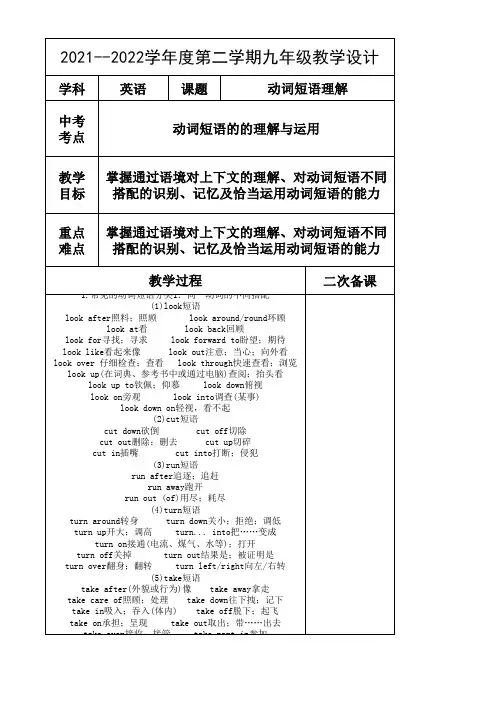
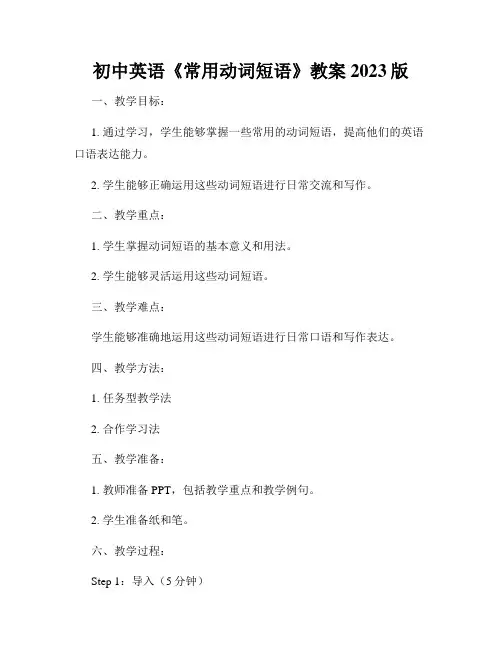
初中英语《常用动词短语》教案2023版一、教学目标:1. 通过学习,学生能够掌握一些常用的动词短语,提高他们的英语口语表达能力。
2. 学生能够正确运用这些动词短语进行日常交流和写作。
二、教学重点:1. 学生掌握动词短语的基本意义和用法。
2. 学生能够灵活运用这些动词短语。
三、教学难点:学生能够准确地运用这些动词短语进行日常口语和写作表达。
四、教学方法:1. 任务型教学法2. 合作学习法五、教学准备:1. 教师准备PPT,包括教学重点和教学例句。
2. 学生准备纸和笔。
六、教学过程:Step 1:导入(5分钟)教师用图片和日常生活场景引入本课主题,激发学生学习的兴趣。
Step 2:学习动词短语(15分钟)1. 教师通过PPT展示一些常用的动词短语,并解释它们的基本意义和用法。
- wake up: 醒来- go for a walk: 散步- have dinner: 吃晚饭- get up: 起床- take a shower: 洗澡- do homework: 做作业- go shopping: 购物- play sports: 运动2. 教师通过图片和简单的例句来帮助学生理解和记忆这些动词短语。
Step 3:练习运用(25分钟)1. 教师与学生一起完成一些口语交流练习,要求学生运用这些动词短语进行对话。
- A: When do you usually wake up?B: I usually wake up at 7 o'clock.- A: What do you do after school?B: I usually do my homework and then go for a walk.2. 学生分组进行小组活动,每组选择一个话题,利用所学动词短语进行交流。
- 话题1: My Daily Routine(我的日常作息)- 话题2: Weekend Activities(周末活动)- 话题3: Hobbies and Interests(兴趣爱好)- 话题4: Holiday Plans(假期计划)3. 学生展示小组成果并进行互动讨论。
初中英语常用短语教案一、教学目标1. 学习掌握常用的英语短语,扩充词汇量;2. 掌握这些短语的用法及常见表达方式;3. 提高学生的英语交流能力。
二、教学内容1. 英语常用的动词短语;2. 英语常用的名词短语;3. 英语常用的形容词短语;4. 英语常用的副词短语。
三、教学过程1. 动词短语1. Hold on: 稍等片刻- Excuse me, can you please hold on for a moment?(对不起,你能稍等片刻吗?)2. Give up: 放弃- Don't give up even when things get tough.(即使事情变得艰难,也不要放弃。
)3. Run out of: 用完,耗尽- We've run out of milk, let's go buy some more.(我们的牛奶用完了,我们去买一些。
)4. Break down: 发生故障- My car broke down on the way to work this morning.(我的车在今天上班的路上出故障了。
)5. Look forward to: 期待- I'm looking forward to the summer vacation.(我期待着暑假。
)2. 名词短语1. A piece of cake: 小菜一碟,易事- Don't worry, this exam will be a piece of cake for you.(不用担心,这次考试对你来说是小菜一碟。
)2. A breath of fresh air: 新鲜空气- After staying indoors all day, I went outside to get some fresh air.(在室内呆了一整天后,我出去呼吸新鲜空气。
)3. A waste of time: 浪费时间- Spending too much time on social media is a waste of time.(在社交媒体上花太多时间是浪费时间。
中考英语中的动词短语词义辨讲课教案一、选择题1.I know how busy you must be and naturally I wouldn’t want to ________ too much of your time.A.take on B.take away C.take up D.take off2.He always ________ his friends about everything. In fact, he has no thoughts of his own. A.talks with B.plays withC.deals with D.agrees with3.—In order to improve my English, I have already made a detailed plan.—Great! I think all you need to do next is _________.A.pick it out B.carry it out C.find it out D.point it out 4.— Hi, Simon! You look so excited. What happened?—We won the football match, and the result ________ to be better than expected.A.turned out B.found out C.worked out D.came out 5.Much to everyone’s surprise, Hi, Mom ________ to be a biggest hit.A.turns out B.puts out C.carries out D.breaks out 6.—It is careless of him to________ the books on the table. What a mess!—Maybe he is getting uncomfortable from staying up too late every day.A.knock over B.knock down C.knock off D.knock on7.A big fire ________ in a factory last month. It is important for us to be careful with fire. A.put out B.turned out C.got out D.broke out 8.—What happened, Martin?—Last night, someone ________ my house and stole many valuable things.A.broke into B.broke down C.turned into D.turned down 9.A forest fire ________ in September in Australia last year and many rare animals lost their lives in it.A.turned out B.broke out C.put out D.worked out 10.—Oh, my God! I have ________ 5 pounds!—No worries. It’s normal for a growing teenager.A.put up B.put down C.put on D.put off 11.—Have you made a plan to raise money to protect the animals in danger?—Yes. Now we are thinking about how to ________.A.pick it out B.carry it out C.find it out D.put it out 12.—Who’s going to ________ the children while you are away?—Don’t worry. My mum will come.A.look at B.look around C.look after D.look like 13.We are supposed to ________ smart phones and take more exercise instead.A.put up B.put away C.put on D.put out 14.Steve Jobs was a great man who ________ the use of digital music.A.pushed away B.pushed for C.pulled out D.put in15.He used to ________ with his friends and watch movies in the cinema.A.stay up B.wake up C.come up D.make up 16.Such lovely weather! Let's _________ the tent near the lake.A.build up B.put up C.put in D.build in 17.Last week a fireman came to our school and told us what to do if a fire ________. A.breaks out B.works out C.puts out D.runs out 18.—Aunt Lexie, could you please teach me how to _________ "red envelope" on WeChat?—Certainly. It goes like this.A.give away B.give up C.give back D.give out 19.—________ at these three years in junior high, which teacher will you miss most?—Mr. Zhang. His classes are always interesting and lively.A.Looking back B.Looking around C.Looking up D.Looking for 20.Andrew once tried to ________ a brighter light in his bedroom, but he failed in the end. A.put on B.put in C.put out D.put up 21.Daniel, stop playing computer games, please! It has ________ your free time too much. A.turned up B.picked up C.put up D.taken up 22.You’d better________all the questions before having the test.A.look after B.look at C.look out D.look through 23.Make sure that you have prepared everything well before you ________ the plan. A.carry out B.break out C.turn out D.put out24.A new high-speed railway station ________ Taixing ________ Shanghai will be built soon. A.connecting; to B.connected; to C.connects; with D.connected; and 25.— Excuse me, which is the way to Kaiming Middle School?—________ this street, and you’ll find i t on your right.A.Write down B.Go down C.Lie down D.Sit down 26.—What can I do for you, Linda?—I hope you can help me ________ the useless words in my article.A.make up B.cut out C.turn off D.put up27.The rain has stopped. Why not ________ the raincoat?A.take away B.pass away C.put away D.put off 28.Children’s Day is on the way. Many shops have ________ huge posters with the word “SALE”.A.put on B.put in C.put away D.put up29.Far water does not ________ near fire.A.put up B.put away C.put out D.put in30.All of us had a good time during this year’s May Day holiday because we ________ five days________ .A.had...off B.took...off C.put...off D.turned...off 31.—Dad,would you please____a brighter light in my bedroom?—Certainly.A.put in B.hand out C.hand in D.put out 32.Most boys ________ toy guns while girls ________ have dolls.A.would rather; prefer B.prefer; would ratherC.would rather; would rather D.prefer; prefer33.—Where is Jack? His mother is looking for him.—Oh, he is _________ leaflets there to make people know more about UNICEF.A.putting out B.putting in C.handing out D.handing in 34.V olunteers ________ leaflets to encourage more people to separate rubbish correctly. A.put out B.find out C.hand out D.turn out 35.—Your spoken English is very good. How do you improve it?—Thanks. Mrs. Wang always asks us to ________ dialogues in our English classes and practice speaking English as often as possible.A.take up B.make up C.put up D.mop up 36.—What do the students think of this book?—It’s rea lly a good book. They all________it.A.look over B.think about C.think highly of D.win the heart of 37.—What should I do when an earthquake happens, Dad?—First of all, it’s important to ________ and hide yourself in the corners of the room.A.fall down B.calm down C.come down D.get down38.A society cannot be successful if it ________ tradition, but it cannot be successful either if we do something to stop progress.A.takes away B.throws away C.gets away D.puts away39.If parents do everything for their ch ildren, they won’t learn to ________ themselves. A.depend on B.get on C.put on D.come on 40.—Hello, this is Taicang Middle School.—I want to talk to Mr. Chen. Can you ________ me ________?A.put…in B.put…out C.put…through D.put…up【参考答案】一、选择题1.C解析:C【详解】句意:我知道你一定很忙,自然我不想占用你太多的时间。
精品英语中的动词短语词义辨讲课教案一、选择题1.When you are given a difficult task, try to ________ it and finish it.A.join in B.stick with C.search for D.think of2.The book is written by T. C.Smith.What does the “T. C.”?A.pay attention to B.regard as C.stand for D.set off3.It’s rude and impolite to ________ before others while everyone is queuing to buy tickets. A.take in B.cut in C.put in D.break in4.Far water does not ________ near fire.A.put up B.put away C.put out D.put in 5.—What happened, Martin?—Last night, someone ________ my house and stole many valuable things.A.broke into B.broke down C.turned into D.turned down 6.Daniel is the most modest boy in our class, because he never ________ in public.A.gets off B.takes off C.shows off D.turns off7.It ________ the director of Hi, Mom has become one of China’s most successful female filmmakers.A.runs out B.breaks out C.hands out D.turns out 8.—How was your May Day holiday?—Just so-so. We drove to Suzhou and tried to find a place for parking, but they were all________. A.turned up B.stayed up C.taken up D.put up9.— How can I get good grades in the listening test, Miss Lin?— You can the questions quickly before listening.A.look through B.go over C.pay attention to D.take notice of 10.We are supposed to ________ smart phones and take more exercise instead.A.put up B.put away C.put on D.put out11.Do you think it is necessary to ________ a special home for the elderly with life difficulties. A.set out B.set up C.set down D.set off 12.Steve Jobs was a great man who ________ the use of digital music.A.pushed away B.pushed for C.pulled out D.put in 13.—Many students don’t know how to ________ stress and become worried.—I think they’d better ask their teachers for help.A.argue with B.come up with C.deal with14.Judy waited a long time for her mom, but she didn't ________.A.show up B.get up C.wake up D.stay up15.—I ________ reading English every morning.—Yes, English is very important and it ________ the first language in England and some other countries.A.used to; is used by B.used to; is used asC.am used to; is used as D.am used to; is used by16.Last week a fireman came to our school and told us what to do if a fire ________. A.breaks out B.works out C.puts out D.runs out 17.—Aunt Lexie, could you please teach me how to _________ "red envelope" on WeChat?—Certainly. It goes like this.A.give away B.give up C.give back D.give out18.—________ at these three years in junior high, which teacher will you miss most?—Mr. Zhang. His classes are always interesting and lively.A.Looking back B.Looking around C.Looking up D.Looking for 19.He always ________ his friends about everything. In fact, he has no thoughts of his own. A.talks with B.plays withC.deals with D.agrees with20.—How terrible the disaster is! Many people lose their homes and most of them are badly hurt.—I’m sure things are going to ________ fine because the soldiers, the most lovely people, are trying to help them.A.find out B.turn out C.run out D.put out 21.Based on local cultures and museums, schools should develop local courses ________ art, history, geography, and biology.A.led to B.taken on C.chosen from D.connected with 22.You’d better________all the questions before having the test.A.look after B.look at C.look out D.look through 23.Make sure that you have prepared everything well before you ________ the plan.A.carry out B.break out C.turn out D.put out 24.—Excuse me, does Mr. Smith’s son live here?— He ________ be here. But now he ________ in the city.A.used to; is used to live B.was used to; is used to livingC.used to; is used to living D.is used to; used to live25.My brother often _________ his spare time to help me with my spoken English.A.puts up B.gives up C.opens up D.tidies up 26.There’s no doubt the Belt and Road will successfully ________ cooperation and development between China and other countries along the line.A.push for B.care for C.look for D.hope for 27.Children’s Day is on the way. Many shops have ________ huge posters with the word “SALE”.A.put on B.put in C.put away D.put up28.My father always tells me to ________ any possible challenge myself instead of giving up easily!A.take away B.take off C.take up D.take on29.—I’m sorry to ________ on you, but there is something I don’t understand.—It do esn’t matter.A.cut down B.cut out C.cut in D.cut off 30.—Why did Linda come to China?—To experience Chinese culture and ________ the most suitable university to attend.A.turn out B.put out C.run out D.find out 31.—Dad,would you please____a brighter light in my bedroom?—Certainly.A.put in B.hand out C.hand in D.put out32.The person who ________ a new idea of how to work out the puzzle will be given a(n)________.A.keeps up with; praise B.comes up with; prize C.ends up with; price D.puts up with; award33.—The Civil Code (民法典) ________ to be a big success and it is a milestone in our country legal science.—I can’t agree more.A.turns out B.puts out C.takes out D.breaks out 34.—What should I do when an earthquake happens, Dad?—First of all, it’s impo rtant to ________ and hide yourself in the corners of the room.A.fall down B.calm down C.come down D.get down 35.The workers ________ a sign to warn people of the danger here.A.put out B.put in C.put up D.put on36.If parents do everything for their chil dren, they won’t learn to ________ themselves. A.depend on B.get on C.put on D.come on 37.—Have you made a plan to raise money to protect the animals in danger?—Yes. Now we are thinking about how to ________.A.pick it out B.carry it out C.find it out D.put it out 38.Sometimes results will just ________ opposite of our wish. We need to accept them anyway. A.carry out B.break out C.run out D.turn out39.The baby is sleeping. Would you please ________?A.turned the radio on B.turn the radio downC.turned the radio off D.turn the radio up40.—Where is Jack? His mother is looking for him.—Oh, he is _________ leaflets there to make people know more about UNICEF.A.putting out B.putting in C.handing out D.handing in【参考答案】一、选择题1.B解析:B【详解】句意:当你接到一项困难的任务时,试着坚持下去并完成它。
初中英语动词短语运用教案教案概述:本教案旨在帮助初中学生掌握常用的英语动词短语,提高其在英语写作和口语表达中的运用能力。
通过教学活动的展开,学生将能够理解不同动词短语的含义和用法,并积极运用到实际情景中,从而提高其英语表达的准确性和丰富性。
一、教学目标:1. 学习和掌握常用的英语动词短语;2. 理解不同动词短语的含义和用法;3. 能够准确运用所学的动词短语进行英语写作和口语表达。
二、教学重点:1. 掌握常用的英语动词短语;2. 理解不同动词短语的含义和用法。
三、教学准备:1. PowerPoint或白板;2. 教材或课件。
四、教学过程:Step 1:导入(5分钟)1. 通过举例子让学生对动词短语有初步了解。
Teacher: Good morning, class! Today we are going to learn about English verb phrases. Can anyone give me an example of a verb phrase?(Student response)Step 2:呈现与讲解(15分钟)1. 展示PPT或白板上列出的常用动词短语,向学生讲解每个短语的含义和用法,并附上相应的例句。
Teacher: Now, let's look at some common English verb phrases. Pay attention to the meanings and usage of each phrase. Here are a few examples:- break down: to stop functioning properlyExample: My car broke down on the way to work, so I had to call for help.- come up with: to think of or suggest somethingExample: The students had to come up with a creative idea for their science project.(继续讲解其他短语)2. 提醒学生抄写短语并理解其含义和用法。
中考英语动词梳理教案人教版教案标题:中考英语动词梳理教案(人教版)教学目标:1. 理解动词的基本概念和作用;2. 掌握常见动词的用法和时态变化;3. 能够正确运用动词进行句子构建和语境运用。
教学重点:1. 动词的基本概念和作用;2. 常见动词的用法和时态变化。
教学难点:1. 动词时态的运用;2. 动词的不规则变化。
教学准备:1. 教材:人教版中考英语教材;2. 多媒体设备;3. 板书工具。
教学过程:Step 1:导入(5分钟)通过播放一段短视频或展示一些图片,引起学生对动词的兴趣,并了解他们对动词的初步认识。
Step 2:讲解动词的基本概念和作用(10分钟)1. 通过示意图或板书,解释动词是表示动作、状态或存在的词语,是句子的谓语。
2. 引导学生思考动词在句子中的作用,例如描述人物的行为、叙述事件的发生等。
Step 3:介绍常见动词的用法和时态变化(15分钟)1. 分组讨论:将学生分成小组,每个小组负责研究一个常见动词的用法和时态变化,如"do"、"go"、"have"等。
要求学生查阅教材和参考资料,搜集相关信息,并准备小组报告。
2. 小组报告:每个小组轮流进行报告,介绍所研究的动词的基本用法、常见短语搭配以及不同时态的变化规则。
3. 整理总结:老师在黑板上总结整理各个动词的用法和时态变化规则,并与学生一起进行讨论和补充。
Step 4:练习与运用(20分钟)1. 完成填空练习:以所学动词为基础,设计一些填空练习,要求学生根据语境和时态要求填入正确的动词形式。
2. 进行口语操练:学生两人一组进行对话练习,要求运用所学动词进行实际对话,加强口语表达能力。
3. 完成写作任务:给学生一个简单的写作任务,要求使用所学动词进行句子构建,展示对动词的正确运用。
Step 5:总结与拓展(5分钟)1. 总结所学内容:请学生总结本节课所学动词的用法和时态变化规则,并进行口头回答或书面总结。
学习资料
精品文档初中英语动词短语整理
1. break
break down破坏,出毛病,拆开
break off暂停,中断
break in破门而入,打断
break into破门而入,突然…起来
break out爆发
break away from打破陈规;奋力挣脱;放弃习惯
break through 出现,突破
break up打碎,拆散,分裂、分解
2. call
call at a place (车船等)停靠;到某地拜访。
call away 叫走,叫开…;转移(注意力等)。
call back唤回; 回电话;
call for需要,要求
call for sth (sb) 喊着叫某人来,喊着叫人取来某物
call in 叫进,请进; 找来,请来;来访;收回
call off取消; 叫走,转移开
call (up)on sb 拜访或看望某人
call sb sth 为某人叫某物
call (up)on sb to do sth
叫(请)某人做某事
call up给…打电话; 想起,回忆起; 召集,应召入伍
call out大喊,高叫;叫出去
3. come
come down下跌,落,降,传下来come in进来
come out出版,结果是
come on来临/ 快点
come along一道来,赶快
come over走过来
come up发芽,走近
come back回来
come from来自,源自
4. cut
cut down砍倒,削减
cut up连根拔除,切碎
5. die
die of死于(疾病,饥饿,寒冷,情
感原因)
die from死于(外界原因)
die out绝种
6. fall
fall behind落后
fall down掉下,跌倒
fall into 落入;陷入
fall off 从。
掉下
fall out与。
争吵
7. go
go along沿着。
走
go through通过,经受
go over复习,检查
go up(价格)上涨,建造起来
go against违反
go away离开
go by时间过去
go down降低,(日、月)西沉
go on(with)继续进行
go out外出,熄灭
go off发出响声
8. get
get down下来,记下,使沮丧
get on进展,进步,穿上,上车
get off脱下,下车
get away逃跑,逃脱,去休假
get over克服,从疾病中恢复
get along with进展,相处
get up起床
get into (trouble) 陷入困境中
get back取回,收回
get out 出去
get to 到达。
9. give
give away赠送,泄露,出卖
give out发出,疲劳,分发,
give in (to sb.) 屈服
give up放弃,让(座位)
10. hand
hand in交上,提交
hand out分发
11.hold
hold on to…继续,坚持
hold up举起,使停顿
hold on别挂电话,等,坚持
12. keep
keep up with跟上
keep out 不使。
进入
keep from克制,阻止
keep away from避开,不接近,
keep on继续,坚持下来
keep down 使。
处于低水平
13.knock
knock at/on敲
knock into撞到某人身上
14. look
look up查找,向上看
look through翻阅,浏览
look after/ at / for 照顾/看/寻找
look out(for)当心
look about / around/round四下查看look forward to盼望
15. make
make up编造,打扮,组成
make into / of / from 制成
16.pass
pass by经过
pass down(on)…to传给
17. pay
pay back还钱,报复
pay for付钱,因…得到报应
18. pick
pick up拾起,接人,站起,收听,pick out挑选,辨认,看出
19. put
put up张贴,举起,
put out伸出,扑灭
put off推迟
put into放进,翻译
put away放好,存钱
put down记下,平息
put on穿戴,上映,
put aside放到一边
put back放回
21. run
run after追逐,追捕
run away逃跑
run off跑掉,迅速离开
run out of用完
22. set
set up建立
set off 激起,引起
23. take
take after 与…相像
take off脱掉,起飞
take away拿走take up从事,占用(时间空间)
take down记录,取下
take back收回
take pride in以… ……为自豪,
take the place of 代替
24. think
think of想起,考虑,对…看法
think out(自然)想出办法
think up想出(设计出、发明、编造)
think about考虑
think over仔细考虑
25. turn
turn off / on打开
turn to翻到,转向,求助
turn down调低,拒绝
turn back返回,转回去
turn round转过身来
turn up向上翻,出现,音量调大
26. care
care about 担心,关心;在乎,介意
care for 关心,关怀,照顾
27. clean
clean up 把…打扫干净,把…收拾
整齐
clean out 清除;把…打扫干净
28.learn
learn about 获悉,得知,认识到
learn from 从/向。
学习
29. fight
fight for..争取获得…
fight against 争取克服、战胜…
fight with…与。
搏斗/战斗
30. dream
dream of梦想,想橡
dream about 梦到。
31. work
work for 为。
工作
work out 产生结果;发展;成功
32. argue
argue with …与。
争论
argue about..争论。
33. complain
complain to 向。
抱怨
complain about抱怨。
34. hear
hear of 听说,得知
hear about听到。
的事,听到。
的话
hear from接到。
的信
35. talk
talk about 讨论。
talk with/to..和。
讨论
36. live
live in 住在。
live on 以。
为主食
37. stand
stand out 突显,引人注目
stand up 起立,站起来
38.其它常用词组
wake up 醒,唤醒,弄醒
stay up 不睡觉;熬夜
depend on依靠;取决于
worry about为。
担忧
laugh at嘲笑。
begin with以。
开始
mix up混合、搀和
major in 主修
grow up成长
open up 打开,张开;开发
end up到达或来到某处;
达到某状态
throw away 丢弃。
精品文档
ask for要求。
wait for等待。
agree with同意。
find out(经研究或询问)获知某事send out 发出,放出,射出search for 搜索,搜查
chop down 砍到
have.. on 穿着。
step out of 跨步走出
drop out of 从。
掉出
happen to 发生在。
belong to属于
arrive in /at到达。
try on试穿。
vote on对。
进行投票
strech out伸展。
hang out闲逛
leave for离开前往
sell out 卖完、售完
show up 出席;露面
精品文档。